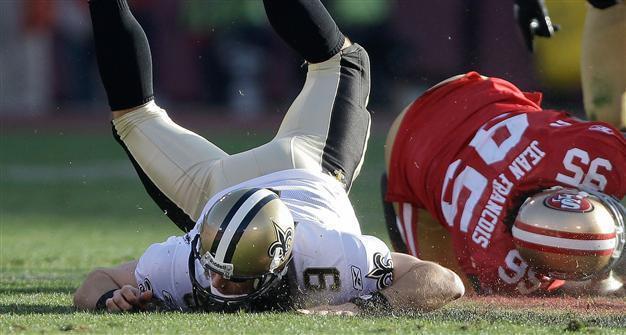Saints owner backing coach in bounty scandal
NEW ORLEANS - The Associated Press

New Orleans Saints quarterback Drew Brees (9) hits the ground in front of San Francisco 49ers defensive tackle Ricky Jean-Francois (95) during the second quarter of an NFL divisional playoff football game Saturday, Jan. 14, 2012, in San Francisco. AP photo
New Orleans Saints owner
Tom Benson isn't backing off his support of his general manager and coach, even as his team is accused by the
NFL of maintaining a bounty program to injure opponents.
While Benson cooperates with NFL officials in their investigation of the bounty program that spanned the last three seasons, he is standing behind general manager Mickey Loomis and head coach Sean Payton even though the league says they knew about the bounties.
"The bond between Sean and Mickey and Mr. Benson could not be stronger," a team the official told The Associated Press on Monday on condition of anonymity because the investigation was still ongoing. "(Benson) is 110 percent behind his guys." The NFL investigation found between 22 and 27 defensive players on the Saints, as well as former assistant coach
Gregg Williams, maintained a bounty system for inflicting injuries on targeted players.
Former defensive coordinator Williams has admitted to running the pool, and the NFL's investigation concluded that Loomis and Payton did nothing to prevent it, even after Benson was alerted of the pool by the NFL last year and asked Loomis to put a stop to it.
"The team completely understands the ramifications, is taking the matter very seriously and has cooperated fully with the league," said the Saints official. "Mr. Benson is in constant contact with (Commissioner) Roger Goodell and his office, yet he remains steadfast in his support of Mickey and Sean, and his focus is on the upcoming free agency, making the team better and hosting the Super Bowl. ... We have a lot of positive things on our plate that we have to get working on." The NFL's report said the Saints maintained a bounty pool of up to $50,000 the last three seasons. Payoffs were made for inflicting game-ending injuries on targeted players, including quarterbacks Brett Favre and Kurt Warner. "Knockouts," in which a player was knocked out of the game, were worth $1,500 and "cart-offs," in which players had to be helped off the field, were worth $1,000. Payments doubled or tripled for the playoffs.
Williams, who was summoned to New York on Monday to meet with NFL officials, called his role in the pool a "terrible mistake" when he issued a public apology late last week.
No punishments have been handed out, but they could include suspension, fines and loss of draft picks.
Next season's Super Bowl is scheduled for New Orleans, and the Saints hope to be a contender coming off a 13-win 2011 season that ended with a dramatic loss in the final seconds of a divisional-round playoff game at San Francisco. Yet, the Saints could potentially find themselves playing some games without several key returning defensive players such as linebacker Jonathan Vilma and strong safety Roman Harper if they are found to have participated in the pool.
In Week 14 against Tennessee last season, Harper made two hits that drew a total of $22,500 in fines.
Harper was fined $15,000 for roughing the passer on a helmet-to-helmet hit, and another $7,500 for unnecessary roughness when he pulled down receiver Damian Williams by his helmet after a long catch and run. The tackle likely stopped Williams from scoring, and Gregg Williams defended Harper's aggressiveness on that play after the game.
Harper and several of his current and former defensive teammates who played during Williams' tenure in New Orleans have not responded to phone messages.
Loomis and Payton also have not commented on the probe.
All payouts for specific performances in a game, including interceptions or causing fumbles, are against NFL rules. The NFL also warns teams against such practices before each season.
The NFL said its findings in its probe of the Saints were corroborated by multiple, independent sources, and the pool amounts peaked in 2009, the year the Saints won the Super Bowl.
